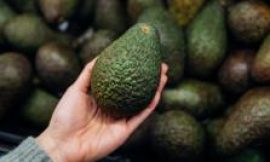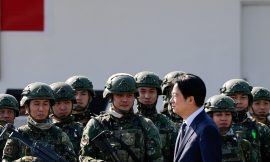Osmond ChiaBusiness reporter
Starbucks says it is selling a 60% stake in its business in China as part of a $4bn (£3.04bn) deal with investment firm Boyu Capital.
Under the agreement, the world’s biggest coffee chain will have a 40% stake in the Chinese retail operation and retain ownership of the Starbucks brand there.
Starbucks entered China in 1999 and the country is now its second-largest market outside the US, but has struggled in recent years with the rise of homegrown brands like Luckin Coffee.
The business will continue to be headquartered in Shanghai and will own and operate 8,000 outlets in the Chinese market, with plans to grow to as many as 20,000 locations, the firm said on Monday.
The partnership with Boyu is a “significant milestone” and signals its plans for long-term growth in China, Starbucks said as it put a $13bn valuation on its retail operations in China.
The collaboration “combining Starbucks globally recognised brand, coffee expertise, and partner (employee)-centred culture with Boyu’s depth of understanding of Chinese consumers,” it added.
Starbucks said it plans to introduce new drinks and digital platforms in China, adding that the deal will be finalised next year.
Boyu Capital is a private equity firm that invests in retail, financial services and technology businesses. The company has offices across Asia, including in Shanghai, Hong Kong and Singapore.
Starbucks’ future in China had been uncertain for months after former boss Laxman Narasimhan said last year that the company was exploring “strategic partnerships” to stay competitive in the world’s second largest economy.
The agreement marks one of the biggest deals involving the Chinese operations of a global consumer company in recent years.
KFC and Pizza Hut’s operations in China were spun off by their owner Yum! Brands in 2016 after struggling in the country for years.
Other major US brands like fashion chain Gap and ride-hailing platform Uber have also faced challenges in China.
In recent years, Starbucks has seen falling sales in China, due to the Covid-19 pandemic, slower consumer spending and fierce competition.
Beijing-based Luckin Coffee now runs more shops in China than Starbucks and has won a loyal following with its lower prices and frequent discounts.
Starbucks has also cut its prices in the country in a bid to compete with domestic rivals, but this has had an impact on its profits.
Since being appointed as Starbucks’ chief executive last year, Brian Niccol has been on a mission to turn around the global business.
The former Chipotle boss has led a revamp of Starbucks’ menu, and has said he would hire more baristas while scaling back automation efforts.
The chain has more than 40,000 outlets around the world.




